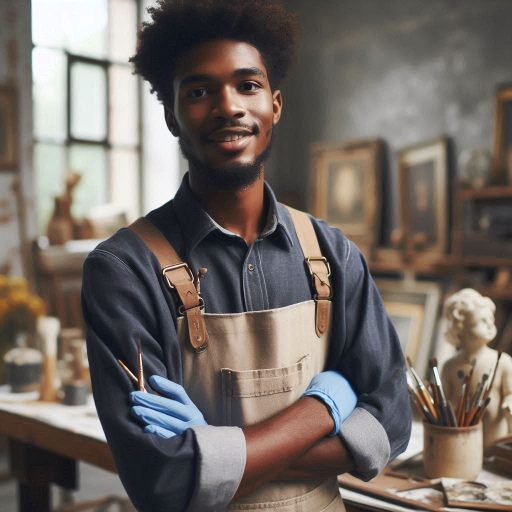Introduction
Networking is crucial for art conservators and restorers.
It opens doors to new opportunities and fosters professional growth.
By connecting with peers, experts, and institutions, conservators can exchange knowledge and collaborate on projects.
Networking in this context involves building and maintaining relationships within the art conservation field.
It’s about meeting other professionals, sharing experiences, and staying informed about industry developments.
This interaction helps in creating a supportive community of practice.
The benefits of effective networking are numerous.
It can lead to career advancement through new job opportunities or project collaborations.
Networking also provides access to specialized knowledge and resources that are essential for career development.
Engaging with a professional network can enhance your visibility in the field, leading to more recognition and respect.
Additionally, networking helps art conservators stay updated on the latest techniques and trends.
It offers a platform to discuss challenges and solutions with fellow experts, which can improve your skills and understanding.
Networking also enables you to gain insights into different conservation practices and methodologies, broadening your professional expertise.
Overall, active networking is key to achieving long-term success in art conservation.
It not only supports professional growth but also enriches your practice by connecting you with valuable resources and opportunities.
Engaging with the right network can transform your career and keep you at the forefront of the field.
Joining Professional Organizations
The importance of joining organizations such as the American Institute for Conservation (AIC)
Joining professional organizations is crucial for art conservators and restorers aiming to advance their careers.
These groups, such as the American Institute for Conservation (AIC), offer numerous benefits.
How these organizations provide networking opportunities through conferences, workshops, and online forums
First, being part of organizations like the AIC provides essential networking opportunities.
Members can connect with peers, experts, and potential employers in the field.
Transform Your Career Today
Unlock a personalized career strategy that drives real results. Get tailored advice and a roadmap designed just for you.
Start NowThis networking can lead to collaborations and job opportunities that might not be available elsewhere.
Second, these organizations host conferences, workshops, and online forums.
Conferences offer a platform for learning about the latest developments and techniques in art conservation.
Workshops provide hands-on experiences and practical skills that are vital for professional growth.
Online forums allow members to discuss challenges, share knowledge, and seek advice from experts across the globe.
Specific benefits like access to job postings and mentorship programs
Furthermore, membership in these organizations grants access to valuable resources.
Many groups offer job postings that are exclusive to members.
This access can significantly enhance your job search and career progression.
Additionally, mentorship programs are often available.
These programs pair less experienced conservators with seasoned professionals who can offer guidance, support, and career advice.
In summary, joining professional organizations such as the AIC is highly beneficial for art conservators and restorers.
It provides critical networking opportunities, access to industry events, and exclusive resources like job postings and mentorship.
Engaging actively with these organizations can greatly enhance your professional development and career prospects in the field of art conservation and restoration.
Read: Common Misconceptions About Art Conservation
Attending Industry Events
Attending industry events is a crucial aspect of building a strong network as an art conservator/restorer.
These events offer a unique opportunity to connect with peers, gain knowledge, and showcase your expertise.
Value of attending art conservation conferences, local meetups, and gallery openings
Art conservation conferences bring together professionals from across the field, allowing you to learn about the latest trends, techniques, and research in the industry.
Local meetups provide a more intimate setting to network with like-minded individuals in your area.
Gallery openings offer a chance to connect with artists, gallery owners, and collectors who may require your services.
These events can lead to potential collaborations and projects that can help advance your career.
Transform Your Career Today
Unlock a personalized career strategy that drives real results. Get tailored advice and a roadmap designed just for you.
Start NowNetworking potential of events like workshops, seminars, and lectures
Workshops, seminars, and lectures are not only educational but also present great networking opportunities.
Engage with speakers, ask questions, and participate in group discussions to make meaningful connections with fellow professionals in the field.
Take advantage of networking breaks during these events to introduce yourself, exchange business cards, and follow up with contacts afterward.
Building relationships with other professionals can lead to referrals, partnerships, and career growth.
Tips on approaching and connecting with fellow professionals at industry events
- Be proactive and initiate conversations with individuals who share similar interests or expertise.
- Listen actively and show genuine interest in others’ work and experiences.
- Ask relevant questions to demonstrate your knowledge and curiosity about the field.
- Follow up with new contacts through email or social media to maintain connections.
By attending industry events, you not only expand your knowledge and skills but also grow your professional network.
Make the most of these opportunities to establish meaningful connections, collaborate on projects, and advance your career in art conservation/restoration.
Read: Impact of Technology on Art Conservation

Utilizing Social Media
Social media has become a powerful tool for art conservators and restorers to network and showcase their expertise.
Platforms like LinkedIn and Instagram play significant roles in this process.
The Role of Social Media Platforms
LinkedIn is ideal for professional networking.
It connects you with peers, institutions, and potential employers in the art conservation field.
LinkedIn allows you to join groups related to art conservation and restoration, where you can participate in discussions and share knowledge.
Instagram, on the other hand, offers a visual platform to display your work. It’s perfect for showcasing before-and-after images of restoration projects.
This visual content can attract followers, including fellow conservators and art enthusiasts.
The Importance of Creating a Professional Online Presence
A professional online presence is crucial. It enhances your credibility and visibility within the art conservation community.
Your online profiles should clearly highlight your skills, experience, and areas of expertise.
Ensure your LinkedIn profile is up-to-date with a detailed resume, endorsements, and a professional photo.
On Instagram, maintain a consistent and high-quality feed that reflects your best work.
A well-curated profile signals professionalism and dedication.
Tips on Engaging with Other Professionals
Engage actively with other professionals by commenting on their posts and sharing valuable insights.
Transform Your Career Today
Unlock a personalized career strategy that drives real results. Get tailored advice and a roadmap designed just for you.
Start NowOn LinkedIn, participate in discussions within relevant groups and connect with industry leaders.
Send personalized connection requests explaining your interest in their work.
On Instagram, use relevant hashtags to reach a broader audience.
Tag other conservators in posts where they are involved.
Share your work regularly, but also interact with others’ content to build relationships.
Building a network online requires consistency and authenticity.
Regularly update your profiles, engage with others, and share your expertise to establish meaningful connections in the art conservation community.
Read: Art Conservation Techniques and Best Practices
Participating in Workshops and Training Programs
The benefits of participating in workshops and training programs
Participating in workshops and training programs offers numerous benefits for art conservators and restorers.
These sessions provide valuable hands-on experience and exposure to the latest techniques in conservation and restoration.
Attendees gain practical knowledge that can enhance their skills and improve their practice.
Workshops often feature experts who share cutting-edge methods and insights, which are crucial for staying current in the field.
The networking opportunities that come from working alongside other professionals in a hands-on setting
Networking is a key advantage of attending these programs.
Working alongside other professionals in a collaborative environment fosters meaningful connections.
These interactions can lead to potential collaborations, job opportunities, and a broader professional network.
Engaging with peers in person helps build relationships that online platforms alone may not offer.
The shared experience of tackling conservation challenges together strengthens bonds and creates lasting professional ties.
How to make the most of networking during these programs
To make the most of networking during these programs, approach interactions with a clear strategy.
Start by introducing yourself and sharing your specific interests and expertise.
Be proactive in joining discussions and asking questions that showcase your curiosity and knowledge.
Transform Your Career Today
Unlock a personalized career strategy that drives real results. Get tailored advice and a roadmap designed just for you.
Start NowExchange contact information with fellow attendees and follow up after the event.
Keeping in touch with new contacts can lead to future opportunities and collaborations.
Lastly, be open to offering help and sharing your own experiences, as reciprocity builds stronger connections.
Read: Top Museums Hiring Art Conservators/Restorers
Seeking Out Mentorship
The importance of mentorship in the art conservation field
Having a mentor in the art conservation field can be invaluable for both personal and professional growth.
Mentors bring a wealth of knowledge and experience that can help guide you in your career.
They can provide valuable insights, advice, and support that can help you navigate the complexities of the industry.
How networking can lead to finding a mentor who can provide guidance and support
One of the best ways to find a mentor is through networking.
By attending events, conferences, and workshops related to art conservation, you can meet professionals in the field who may be willing to take you under their wing.
Networking allows you to make connections with individuals who have the same passion for preserving and restoring art.
Tips on how to approach potential mentors and build a lasting relationship
When approaching potential mentors, it is essential to be genuine and respectful.
Show interest in their work and ask thoughtful questions that demonstrate your eagerness to learn.
Be open to feedback and be willing to put in the effort to improve and grow as a conservator/restorer.
Building a lasting relationship with a mentor takes time and effort.
Stay in touch regularly, update them on your progress, and seek their advice when facing challenges.
Show your commitment to learning and improving by implementing their suggestions and incorporating their feedback into your work.
Remember that a mentor-mentee relationship is a two-way street.
While they provide guidance and support, you also have a responsibility to be receptive to their advice and act on it.
Be respectful of their time and expertise, and show gratitude for the wisdom they share with you.
In essence, seeking out mentorship in the art conservation field is a crucial step in your professional development.
Transform Your Career Today
Unlock a personalized career strategy that drives real results. Get tailored advice and a roadmap designed just for you.
Start NowBy networking and connecting with experienced professionals, you can find a mentor who can provide invaluable guidance and support as you navigate your career in art conservation/restoration.
Collaborating with Other Professionals
Networking plays a crucial role in the career of art conservators and restorers.
Collaborating with fellow professionals can greatly benefit your work and career growth.
The benefits of collaborating with fellow art conservators, restorers, and artists
First, working with other conservators, restorers, and artists brings multiple advantages.
Collaboration opens doors to shared expertise and diverse techniques.
It enhances problem-solving skills and expands your knowledge base.
Engaging with a network of professionals also creates opportunities for joint projects.
Such projects often lead to innovative solutions and high-quality results that might not be possible alone.
How networking can lead to collaborative projects, shared resources, and learning opportunities
Networking can lead to valuable collaborative projects.
By connecting with others in your field, you can access shared resources.
This might include tools, materials, or even workspace.
Additionally, collaboration fosters learning opportunities.
You gain insights from different perspectives and methods.
This exchange of ideas can spark creativity and improve your techniques.
It also helps in staying updated with industry trends and best practices.
How to initiate collaborations and maintain professional relationships
To initiate collaborations, start by attending industry events and joining relevant professional organizations.
Be proactive in introducing yourself and expressing your interest in working together.
Don’t hesitate to propose ideas for joint projects.
Follow up with potential collaborators to discuss mutual goals and how you can complement each other’s skills.
Building relationships takes time, so remain consistent in your communication and engagement.
Transform Your Career Today
Unlock a personalized career strategy that drives real results. Get tailored advice and a roadmap designed just for you.
Start NowMaintaining professional relationships is equally important.
Keep in touch with your contacts through regular updates and check-ins.
Offer assistance or support when possible, and acknowledge their contributions to projects.
By being a reliable and engaged partner, you build trust and strengthen your network.
All in all, collaborating with other art conservators, restorers, and artists enriches your professional journey.
It leads to shared resources, collaborative projects, and ongoing learning.
By initiating and maintaining these connections, you enhance your career and contribute to the broader art conservation community.
Conclusion
Networking stands as a vital tool for art conservators and restorers.
Building strong connections helps in sharing knowledge, resources, and opportunities.
It fosters collaborations that can lead to innovative solutions and enhanced career prospects.
In the field of art conservation, networking opens doors to new projects, job opportunities, and professional development.
Effective networking can significantly impact career growth and success.
By engaging with peers, mentors, and industry leaders, conservators gain access to valuable insights and guidance.
Networking also increases visibility within the industry, making it easier to find job openings and secure positions in prestigious institutions.
Additionally, it facilitates partnerships that can enhance skills and lead to career advancements.
To advance your career in art conservation, start applying these networking tips today.
Attend industry events, join professional associations, and engage in online forums related to art conservation.
Reach out to fellow professionals, seek mentorship, and participate in workshops and conferences.
Building and maintaining a robust network will provide you with the support and opportunities needed to thrive in this specialized field.
Embrace these strategies, and you’ll find yourself more connected and successful in your art conservation career.
Transform Your Career Today
Unlock a personalized career strategy that drives real results. Get tailored advice and a roadmap designed just for you.
Start Now



